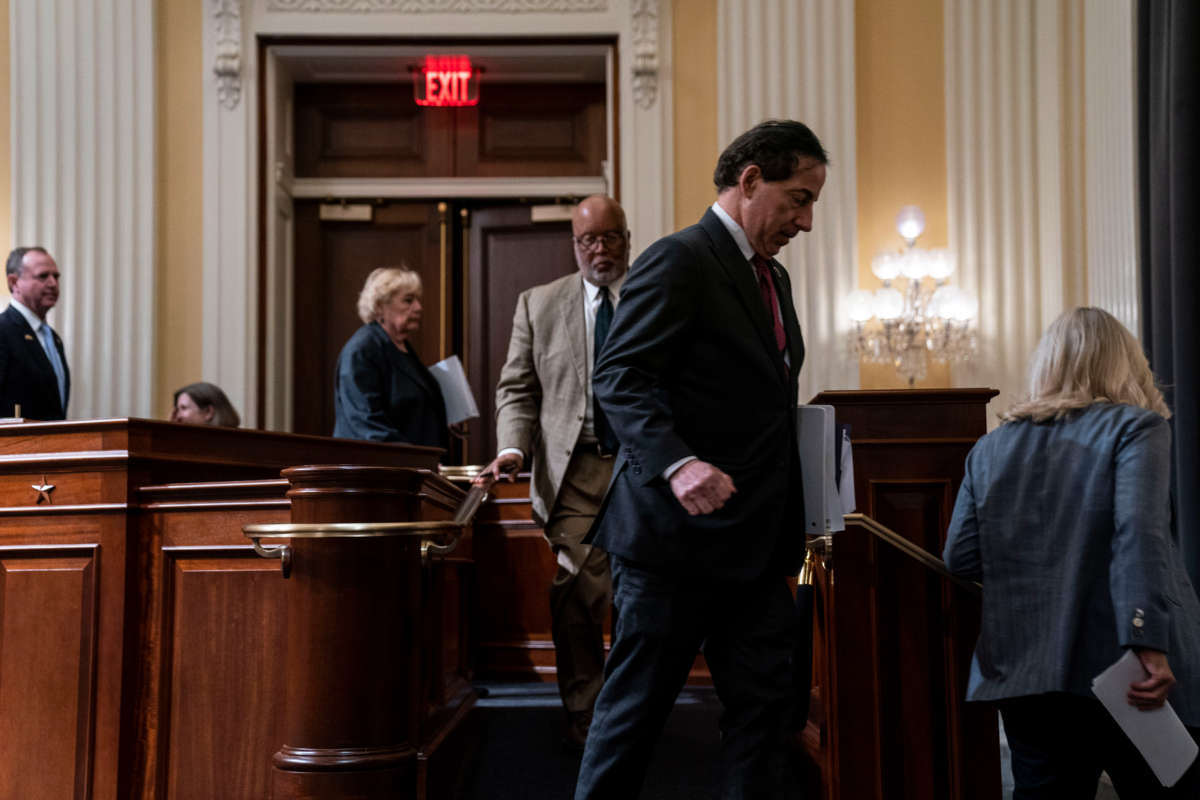The House select committee investigating the January 6 Capitol attack will likely make a series of recommendations on how to avoid further attempted overthrows of power in the future — but one proposal apparently has the committee split.
A number of committee members believe that lawmakers should consider abolishing the Electoral College entirely in order to prevent similar violence in the years ahead. Chief among those pushing for the idea, according to reporting from Axios, is Rep. Jamie Raskin (D-Maryland). But some are wary of the proposal, none more so than Rep. Liz Cheney, a Republican from Wyoming whose low-population state would lose considerable political clout if the Electoral College system was ended.
If the U.S. switched to a popular vote model, the president and vice president would be selected by voters across the country overall, rather than through electors in state-by-state contests that can sometimes thwart the will of the national electorate (as happened in 2016, when former President Donald Trump won office) Ending the Electoral College would also ensure that a scheme to game the system, like the one devised by Trump’s inner circle in late 2020, couldn’t result in a blatant disregard of voters’ preferences.
Trump lost both the popular vote and the Electoral College in 2020 to President Joe Biden. But his campaign team, including his former lawyer Rudy Giuliani, orchestrated a plan to win the election anyway by producing fake Trump electors in states that Biden won, hoping that they’d be counted instead in the certification of the election on January 6, 2021 — the same day a mob of Trump loyalists attacked the Capitol building.
One of the main reasons that plan never came to fruition is because Trump’s vice president, Mike Pence, refused to go along with it. On the day the election was set to be certified,Trump made it explicitly clear to his followers that Pence had gone against his wishes — and they responded by chanting for Pence to be hanged as they forced their way into the Capitol building.
Sources speaking to Axios say that January 6 committee members, led by Raskin, believe that ending the Electoral College and instituting a popular vote model could help to avoid such scenarios in the future. But other members, Cheney in particular, are against such moves, claiming that, if the committee were to endorse ending the Electoral College, it could delegitimize the panel’s work overall.
The committee has tried to show a united front in all of its workings thus far, so it seems unlikely that its members will eventually call for an end to the Electoral College. More likely, the two factions will come together and recommend changes to the Electoral Count Act, the law that Trump and his campaign sought to manipulate in order to keep him in office through the counting of fake electors.
In the past, several prominent conservative voices have suggested that calls to end the Electoral College only arise when Democrats lose, such as in 2000, when former President George W. Bush won the election without the popular vote, and in 2016, when Trump did the same. But in reality, the exact opposite is true; typically, a majority of Americans support abolishing the Electoral College no matter what year it is, and dips in support for doing so usually come from conservatives, as the system’s continued use has benefited Republicans twice in the past quarter-century.
Polling from Gallup showed consistent support for getting rid of the Electoral College from both parties — including increases in support from Republican voters — from the time of Bush’s win in 2000 up to Trump’s win in 2016. In that year, however, Republicans’ support for abolishing the Electoral College dropped by 36 percentage points from the previous time Gallup polled on the question, while support for ending the practice remained consistent among Democrats.
A Pew Research poll from last year found that most Americans (55 percent) currently support ending the Electoral College. Although most Republicans still want the Electoral College in place, 37 percent of Republicans supported ending the practice; when Gallup asked the question in 2019, only 25 percent of Republicans were in support of its abolition.
Though Trump was a vehement defender of his Electoral College win throughout his presidency, he, too, expressed support for ending it shortly after his win, only changing his mind, it seemed, when it became clear he might have to rely on the mechanism in order to win reelection.
“I’m not going to change my mind just because I won,” Trump insisted on CBS’s “60 Minutes” days after he won in 2016. “But I would rather see it where you went with simple votes. You know, you get 100 million votes and somebody else gets 90 million votes and you win.”
Our most important fundraising appeal of the year
December is the most critical time of year for Truthout, because our nonprofit news is funded almost entirely by individual donations from readers like you. So before you navigate away, we ask that you take just a second to support Truthout with a tax-deductible donation.
This year is a little different. We are up against a far-reaching, wide-scale attack on press freedom coming from the Trump administration. 2025 was a year of frightening censorship, news industry corporate consolidation, and worsening financial conditions for progressive nonprofits across the board.
We can only resist Trump’s agenda by cultivating a strong base of support. The right-wing mediasphere is funded comfortably by billionaire owners and venture capitalist philanthropists. At Truthout, we have you.
We’ve set an ambitious target for our year-end campaign — a goal of $250,000 to keep up our fight against authoritarianism in 2026. Please take a meaningful action in this fight: make a one-time or monthly donation to Truthout before December 31. If you have the means, please dig deep.
